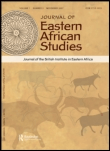
Journal of Eastern African Studies
Scope & Guideline
Cultivating Understanding of Eastern Africa's Socio-Political Landscape
Introduction
Aims and Scopes
- Interdisciplinary Research:
The journal promotes interdisciplinary approaches, incorporating insights from history, anthropology, sociology, political science, and economics to provide a holistic understanding of Eastern African societies. - Focus on Political Dynamics:
A significant portion of the journal's publications addresses political issues, including governance, electoral processes, state formation, and the impact of colonial legacies on contemporary politics. - Social and Cultural Studies:
The journal emphasizes social and cultural dimensions, exploring topics such as migration, identity, gender dynamics, and the role of cultural practices in shaping societal norms. - Economic Development and Policy:
Research on economic issues, including agriculture, land use, and resource management, is prevalent, highlighting the interplay between economic policies and social outcomes in the region. - Refugee and Migration Studies:
There is a strong focus on the complexities of migration, including refugee education, social networks, and the socio-political implications of migration patterns in Eastern Africa. - Historical Contextualization:
The journal includes historical analyses that contextualize current events within broader historical narratives, providing depth to contemporary issues.
Trending and Emerging
- Gender Studies and Feminism:
There is a noticeable increase in research focusing on gender dynamics, women’s roles in political movements, and gendered economic practices, indicating a broader interest in intersectionality and feminist perspectives. - Digital Politics and Social Media:
The impact of social media on political engagement and mobilization is increasingly explored, reflecting the growing importance of digital platforms in shaping political discourse and public opinion. - Migration and Refugee Studies:
Research on migration patterns, refugee experiences, and the socio-political implications of displacement is trending, particularly in light of ongoing conflicts and humanitarian crises in the region. - Urban Studies and Governance:
Emerging themes related to urbanization, governance, and the politics of space are gaining traction as cities in Eastern Africa undergo rapid transformations and face unique challenges. - Climate Change and Environmental Justice:
There is an increasing focus on climate change impacts, environmental justice, and community responses to environmental challenges, highlighting the intersection of ecological and social issues.
Declining or Waning
- Traditional Land Tenure Systems:
Research on traditional land tenure systems and indigenous land rights, once a prominent theme, has diminished, possibly due to the increasing focus on modern economic policies and land reform initiatives. - Colonial History and Legacy:
Although still important, the focus on colonial history and its direct effects on modern governance and society has waned as contemporary political issues take precedence. - Environmental Studies:
While environmental issues remain relevant, the specific focus on traditional ecological knowledge and indigenous practices has decreased, overshadowed by broader discussions on climate change and development. - Health and Disease Studies:
Publications centered on health issues, particularly historical perspectives on disease and public health systems, have become less frequent, possibly due to an increased focus on political and economic themes. - Cultural Heritage and Preservation:
Research dedicated to cultural heritage preservation, though still relevant, appears to have received less emphasis compared to studies on socio-political movements and contemporary cultural expressions.
Similar Journals
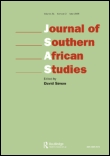
JOURNAL OF SOUTHERN AFRICAN STUDIES
Advancing Knowledge on Southern Africa's Cultural LandscapeThe JOURNAL OF SOUTHERN AFRICAN STUDIES, published by Routledge Journals, Taylor & Francis Ltd, is a premier scholarly outlet dedicated to the exploration and analysis of social, political, and cultural dynamics affecting the Southern African region. With an established history since 1974, this journal features articles that contribute significantly to various disciplines, including Arts and Humanities, Sociology, and Geography, and is recognized within its fields as evidenced by its Q2 and Q3 quartile rankings in the latest assessments. Offering a rich academic platform for researchers, professionals, and students, it fosters interdisciplinary approaches and welcomes critical discourse on contemporary issues, ensuring relevance and impact in today's rapidly changing socio-political landscape. Notably, the journal has achieved commendable rankings on Scopus, affirming its standing as an influential source of knowledge. Although not open access, it remains a vital resource for those seeking to deepen their understanding of Southern Africa and its global implications.

Diasporas-Histoire et Societes
Fostering Dialogue on Global Migration and IdentityDiasporas-Histoire et Sociétés is an esteemed academic journal published by PRESSES UNIV MIDI-PUM, dedicated to the interdisciplinary exploration of diasporas through the lenses of cultural studies, history, sociology, and political science. Since its inception in 2008, the journal has embraced an Open Access model, enhancing accessibility to critical research and discussions surrounding diaspora communities and their histories. Although it currently holds a Q4 quartile ranking across multiple categories, including Cultural Studies and Demography, it serves as an essential platform for innovative scholarship and dialogue in a rapidly evolving field. Based in Toulouse, France, the journal invites contributions from researchers and students alike, presenting a unique opportunity to engage with pressing social issues and historical narratives that define diasporic identities. With a dedicated readership and a commitment to promoting diverse perspectives, Diasporas-Histoire et Sociétés stands as a vital resource for those aiming to understand the complex interplay between societies and their diasporas.
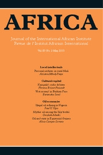
AFRICA
Fostering Scholarly Dialogue on Africa's FutureAFRICA is a premier journal published by Cambridge University Press, dedicated to advancing scholarly research and discourse within the realms of Anthropology, Arts and Humanities, and Geography. Established in 1928, this journal has demonstrated an unwavering commitment to excellence, consistently achieving Q1 status in its respective fields as of 2023, demonstrating its impact and prestige in the academic community. With Scopus rankings highlighting it among the top 80th percentile in Social Sciences and 72nd percentile in Arts and Humanities, AFRICA serves as a vital resource for researchers, professionals, and students seeking to explore the complexities of African societies and cultures. The journal promotes a multidisciplinary approach, encouraging contributions that address contemporary challenges and opportunities within Africa. Although access is not open, AFRICA remains an essential asset for anyone aiming to deepen their understanding of the continent's diverse narratives and dynamics, publishing high-quality, peer-reviewed articles that shape the future of African studies.
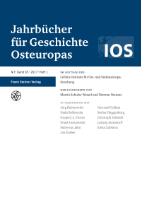
JAHRBUCHER FUR GESCHICHTE OSTEUROPAS
Illuminating the Past: Insights into Eastern Europe's Complex NarrativesJAHRBUCHER FUR GESCHICHTE OSTEUROPAS, published by FRANZ STEINER VERLAG GMBH, is a prominent academic journal dedicated to the exploration of Eastern European history. With its inception dating back to 1978, this journal has consistently provided a platform for scholarly discourse, contributing significantly to the understanding of the region's complex historical narratives. While the journal is not open access, it holds a solid reputation within the academic community, positioned in the Q4 quartile in history as per the 2023 category rankings, and stands at Rank #1636 within the Scopus Arts and Humanities History ranking. The convergence of its publication years throughout the decades emphasizes a long-standing commitment to historical research, thereby making it an essential resource for researchers, professionals, and students interested in Eastern European studies. Explore the intricate dynamics of historical events and cultural developments that shape Eastern Europe through this invaluable periodical.
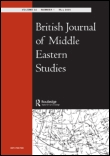
British Journal of Middle Eastern Studies
Connecting Scholars Through Thoughtful Research and DialogueWelcome to the British Journal of Middle Eastern Studies, a premier publication within the field of Middle Eastern studies, published by Routledge Journals, Taylor & Francis Ltd. Established in 1992, this journal has become a pivotal resource for scholars, researchers, and professionals interested in the dynamic intersections of history, geography, and social sciences. It currently holds an impressive Q1 ranking in History and features in the competitive Q3 quartiles for Earth-Surface Processes and Geography, Planning and Development, underscoring its diverse academic contributions. With a focus on interdisciplinary studies and critical analysis, the journal aims to foster dialogue and enrich understanding of the Middle Eastern region through high-quality research articles. Although not Open Access, the journal ensures rigorous peer-reviewed processes, contributing to its respected stature and relevance in today's scholarly discourse. Join a community of engaged scholars by exploring cutting-edge research that continues to shape the field through its thoughtful insights and comprehensive studies.
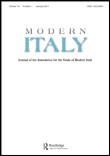
Modern Italy
Advancing Knowledge on Italy's Dynamic HeritageModern Italy, published by Cambridge University Press, stands as a vital academic journal dedicated to the rich tapestry of Italian culture, history, and societal dynamics. With an ISSN of 1353-2944 and an E-ISSN of 1469-9877, this journal not only reflects on Italy's historical narratives but also engages with contemporary issues pertinent to various fields including Anthropology, Cultural Studies, History, and Sociology and Political Science. As of 2023, it has achieved commendable rankings, falling within the Q1 category in Cultural Studies and History, along with a Q2 ranking in both Anthropology and Sociology. These accolades highlight its influence and commitment to scholarly excellence, making it an essential resource for academics, researchers, and students seeking to deepen their understanding of Italy's past and present. Although the journal does not adopt an open access model, its impactful research and vibrant discussions are accessible through academic institutions and libraries, ensuring that critical insights into Italian studies continue to reach a broad audience.
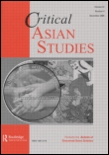
CRITICAL ASIAN STUDIES
Advancing Scholarship on Asia's Critical IssuesCRITICAL ASIAN STUDIES is a leading academic journal published by Routledge Journals, Taylor & Francis Ltd, dedicated to exploring the complex social, cultural, and political dynamics of Asia. With an ISSN of 1467-2715 and an E-ISSN of 1472-6033, this journal serves as an essential resource for researchers and professionals interested in Asian studies, sociology, and geography. Boasting an impressive Q2 ranking in both Geography, Planning and Development, and Sociology and Political Science for 2023, it is recognized for its influential contributions to these fields. The journal’s accessibility options further enhance its appeal, allowing broader dissemination of critical research findings. Established in 1968 and continuing its rigorous publication through to 2024, CRITICAL ASIAN STUDIES facilitates in-depth dialogue and scholarship, thus playing a vital role in advancing understanding of Asian issues on a global scale.

Historia-Santiago
Engaging with Diverse Perspectives on Historical ContextsHistoria-Santiago is an esteemed academic journal published by the Pontificia Universidad Católica de Chile, Instituto de Historia. Since its inception in 2000, the journal has embraced an Open Access model, facilitating broad dissemination of historical research and ensuring that critical scholarly work is freely accessible to researchers, professionals, and students around the globe. With a focus on Latin American history, Historia-Santiago provides a platform for innovative research and contributions that engage with diverse historical narratives and methodologies. The journal aims to foster interdisciplinary dialogue and stimulate scholarly debate, thereby enriching the understanding of historical contexts and their implications in contemporary society. By maintaining high academic standards, Historia-Santiago occupies a vital role in the field of historical studies, encouraging authors to explore new ideas and perspectives that shape the understanding of our past.
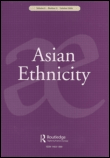
Asian Ethnicity
Connecting scholars to critical conversations in ethnicity.Asian Ethnicity is a premier academic journal published by Routledge Journals, Taylor & Francis Ltd that serves as an essential platform for interdisciplinary research in the fields of cultural studies, sociology, and political science. With an impressive impact factor and a prestigious ranking within the Scopus database, it has earned a place in the Q1 category for Cultural Studies and the Q2 category for Sociology and Political Science in 2023. This journal not only engages a community of scholars, professionals, and students but also addresses critical issues related to identity, migration, and social dynamics across diverse Asian contexts. The journal has consistently published cutting-edge research since its convergence in 2008, aiming to foster dialogue and understanding in the rapidly evolving landscape of Asian studies, while its location in the United Kingdom enhances its global perspective. While the journal does not currently offer open access options, it remains a valuable resource for in-depth analysis and scholarly discourse regarding Asian ethnicity and its multifaceted implications.

Revista Complutense de Historia de America
Unveiling Narratives of the AmericasRevista Complutense de Historia de America, published by the Universidad Complutense de Madrid, is a pivotal academic journal dedicated to the exploration and analysis of historical narratives and events pertaining to the Americas. With an ISSN of 1132-8312 and an E-ISSN of 1988-270X, this peer-reviewed journal has been contributing to the field of history since its inception in 1996 and continues to be an essential resource for scholars aiming to deepen their understanding of historical developments in the region. As a member of the Scopus database, the journal holds a category quartile of Q3 in 2023, positioning it within the competitive landscape of academic historical research, while also ranking at 1205/1760 in Arts and Humanities History, reflecting its impact within the discipline's scholarly community. Although it does not currently offer Open Access, the journal remains committed to disseminating rigorous historical research. Researchers, professionals, and students interested in the complexities of American history will find this journal a valuable repository of knowledge, fostering insightful discussions and scholarly advancements.